Following the Berlin Olympics, the quadrennial event was due to finally arrive in Asia. Tokyo was primarily selected for the 1940 Olympics. However, owing to the increasing tensions, the Olympics were transferred to Helsinki in Finland.
Unfortunately, neither got to host the Olympics. The second World War broke out in 1939, and it did not end until 1945. Like in 1906, one city was not the original choice for the Olympics.
However, owing to the 2nd World War, London got the chance to host the Olympics. However, it had to wait for eight whole years to get the ultimate honor.
London chosen to host the first post-Second World War Olympics
When London did host the Olympics, it was a spectacle of its own. Many new nations arrived on the scene. The Olympics also saw the rise of new heroes. From Fanny Koen to Karoly Takacs, there were many champions to be proud about.
The Olympics also saw the arrival of India, but as a divided nation. India competed before as well, but as an undivided British colony. However, following the events of August 1947, the London Olympics brought forward two nations, India and Pakistan.
The London Olympics also saw the emergence of a new India, who won their first Olympic gold medal as an independent nation. Before independence, Great Britain was too scared to compete against India. Following the Partition, Great Britain was extremely confident that India would be of no match, since the best players had already migrated to Pakistan.
However, India had other plans. Not only did they prove the British wrong, they proved them wrong in style. India pummeled Great Britain in front of a huge home crowd at Wembley Stadium. For the first time, India got to hear their own national anthem at the Olympics.
Guess the score? It was four goals to none. In fact, the British crowd were so impressed by the Indians, that they instead goaded the Indians to go for 6-0. Leo Pinto, one of the goal scorers for India, was also a goalkeeper. This is a rare feat that is still unmatched by many.
Here are some more interesting facts from the London Olympics of 1948.
Second post-War Olympics -
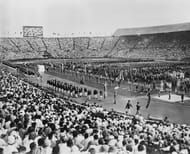
The Berlin Olympics occurred in 1936. Following that, the Olympics were due to be held in Tokyo. For the first time, the Olympics would cross the continents of Europe and America and take place in Asia.
However, it never happened. German aggression led to the Second World War. As a result, the Olympics scheduled for Tokyo were canceled and transferred to Helsinki. However, due to the World War, the Olympics were completely called off.
Guess who benefitted from this situation the most? Again it was the British capital of London. Like in 1908, London wasn't the first choice for the Olympics. However, as in 1908, unforeseen circumstances compelled London to take up the mantle.
Unfortunately, this time, it had to wait for eight whole years to get the opportunity to host the Olympics.
Held from 29 July to 14 August, the London Olympics were the 2nd Games to be held post war. The first edition was held in 1920, at Antwerp in Belgium. After the 30th edition of the quadrennial event was held in London in 2012, the British capital now holds the distinction of being the city which has hosted the Olympics the maximum number of times.
Fanny Blanker-Koen, a mother who ran for Gold -
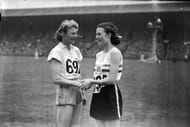
Until the Berlin Olympics, the quadrennial event wasn't well known for famous women athletes. Barring a few exceptions like Helen Stephens, Betty Robinson etc., there were not many women athletes to talk about.
However, at the London Games, one woman broke that myth. Her name was Fanny Blanker-Koen. The mother-of-two, a Dutch runner, competed at the Berlin Games, but wasn't much successful.
At the London Olympics, however, she had a different story. She channelized her inner Jesse Owens, an athlete she adulated and admired. She chose to compete in four events at the London Olympics - the 100m, the 200m, the 80m hurdles, and the 4×100m relay.
Apart from facing professional challenges, Fanny faced the usual media jibes as well. Some journalists questioned her, suggesting 30 years was too old for a woman to be an athlete. The then British athletics team's manager, Jack Crump, opined that she was "too old to make the grade."
However, Fanny Koen decided to let her performance do the talking. She won all the events she participated in.
The very media, that had written her down and out, was now singing praises for her. Fanny was dubbed "The Flying Housewife", "The Flying Dutchman", and "Amazing Fanny" by the international press. She was welcomed back home in Amsterdam by an immense crowd, and taken for a grand ride.
Bob Mathias - A champion who wobbled his way to gold -
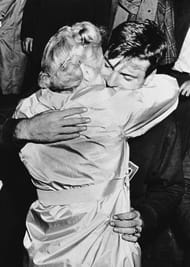
Some people have their unique ways of celebrating victories. Likewise, at the London Olympics, a man won in the most amateurish way possible. It was natural, since he literally did not know the D of decathlon. The name was Robert Mathias, and this is his incredible journey to the gold medal.
When Bob Mathias came to the London Olympics, he was barely 17 years old. He was so naive that he was literally unaware about the technicalities of decathlon. He was unaware of the rules in the shot put and nearly fouled out of the event. He almost failed in the high jump but was able to recover.
However, Mathias soon overcame his difficulties. With a superior showing in the pole vault and the javelin throw segment, he scored enough to win the coveted Olympic gold medal. He became the youngest Olympic gold medalist in any track and field event till date.
Funnily enough, when he was asked how he would celebrate, he replied, tongue in cheek, "I will shave I guess!". Mathias retired in style in 1952, becoming the first decathlete to successfully defend his title.
Karoly Takacs and Leo Pinto - Triumph of spirit over adversity -
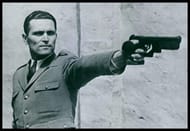
The London Games are also known for the rise of two champions - Karoly Takacs and Leo Pinto. Both were from different countries. Both played different sports. Yet both had one thing in common - a triumph of spirit over adversity.
Karoly Takacs was a Hungarian pistol shooter. Denied a place at the Berlin Olympics on faulty grounds, he was due to make his mark at the 1940 Olympics. However, an accident destroyed his shooting hand, i.e. the right hand.
Now, most would give up in such circumstances. But not Karoly. He taught himself to shoot with his left hand. He came to the London Olympics and competed in the 25 meter rapid fire pistol event. Not only did he win the gold medal, but came back again in 1952 to defend his title.
![Leo Pinto - The reason behind India's golden return to Olympics [Image for Representational Purposes]](https://staticg.sportskeeda.com/editor/2021/07/39762-16259292850761-800.jpg?w=190)
However, he was not the only one. Leo Mathildas Pinto, an Indian hockey player, was another such wonder. A 22 year old player, he was all set to join the Indian team as the goalkeeper at the Berlin Olympics.
However, he incurred a concussion beneath the ear at the trials just before the quadrennial event. As a result, he had to wait for 12 whole years to make the journey.
However, when Leo Pinto made his debut, he made it in style. As a free India's first ever goalkeeper, he conceded just one goal in the three matches he played as a goalkeeper before the finals against Britain.
During the finals, an important penalty stroke came up. To everyone's surprise, Leo Pinto removed his pads and smashed the ball into the goal. He is one of the rare few goalkeepers to have achieved this feat till date in field hockey. Now that's some return!
India's first Olympic gold as a free nation -
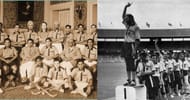
The London Olympics also saw the return of Great Britain to field hockey, and the arrival of India as a divided nation. For the first time, India competed as two separate nations, India and Pakistan.
Legend has it that as long as India competed in field hockey, Great Britain never competed. They were scared of being beaten by their own subjects. However, they decided to compete in the London Games for two reasons.
One, they thought that after the Partition, India wouldn't be the same team they were before independence. Two, they were of the opinion that the best of the talent was never in India anyway.
Most of them migrated to newly created Pakistan, including Ali Shah Dara, a celebrated member of the 1936 Berlin Olympics gold medal winning team.
However, they were proved wrong in style by India. In front of a strong home crowd at Wembley Stadium, London, on the evening of 12 August 1948, India whacked their former masters by 4-0.
Yes, you heard that right. 4-0 was the score, despite having a depleted team, with negligible funds, resources, and of course, jeers and jibes from all corners. India won their 4th consecutive Olympic gold medal, and the first Olympic gold as an independent nation!
Interestingly, during the match, a drizzle made the ground heavy. Finding it slippery, many players, including captain Kishan Lal, decided to play barefoot. When the score was 4-0, the English crowd cheered for the Indian team, goading them to make it half a dozen.
Though it did not happen, for the first time, the Indian national anthem was played at an international sporting event. For the first time, the now eponymous Indian tricolor was raised high at the Olympics.
